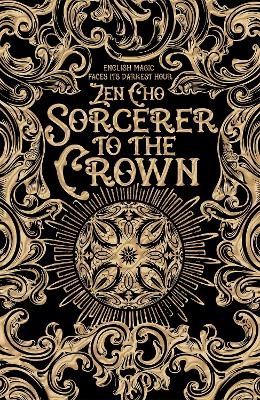Reviewed by nannah on
Content warnings:
- slavery mentions
- racism, racist microaggressions, etc. (in-book & the attitude is challenged)
- sexism, misogyny (in-book & the attitude is challenged)
- ideas of male/female sorcery that’s very limited to the binary/is trans-exclusive
Representation:
- the protagonist is black
- the love interest is not white as well (Indian? They said black at one point, but I’m wondering if it’s “in the context of the time”)
The border between England and Fairyland has become less permeable, and magic is disappearing. Zacharias Wythe, once a slave and now in the esteemed position of Sorcerer Royal, is dedicated to finding out the reason for this problem. Along the way he meets Prunella Gentleman, a spirited young woman driven from a girls’ school with an unusual talent for magic. Even though serious magic is forbidden for women (as it’s unfit for their “delicate constitutions”), together they meet with Fairy Queens and vampire sorceresses and fight the outdated, racist Society that wants Zacharias to hand in his Sorcerer Royal staff -- to keep magic in England.
Okay, I’ll admit I thought at first, “Why do all these books that deal with somewhat traditional magic systems (wands, spells, charms, etc.) have to take place in England? Why is this another one of those boring novels, and do I really want to spend time on this?”. But I give it a chance, because that writing is delicious. I also realized there are so many intricate layers to this story; everything is incredibly well thought through, and no, it’s not just “another story about magic in England”.
Zacharias Wythe is a black sorcerer, once a slave and now in a position of power at a time when the English people … (well, a lot more vocally than now) aren’t comfortable with something like this happening. Zacharias also became Sorcerer Royal in an unusual way, fueling the rest of his peers’ uneasiness and suspicions.
The layers continue to grow, with unexpected nuance and care, with the introduction of our second main character, Prunella Gentleman. She’s a spitfire and a perfect balance to Zacharias’s seriousness and somewhat melancholic nature. She’s also a character I would’ve loved to write. She’s so much fun -- and a lot of trouble. She also brings with her a contrast to Zacharias in that she’s a woman of color being presented as a lady of noble birth (which has a lovely & hilarious spin at the end! I love that every detail has been accounted for).
These layers of interest and complexity grow even further when Zacharias mentions his concerns about the other oppressed peoples in England’s conservative society, like the labouring classes and the women (who are “afflicted” by magic because it affects their “frail constitutions”). Zacharias also studies the magics of other countries in his search to bring magic back to England -- and these countries & magical cultures actually come into play, bringing with them some of the most interesting characters of the book and wonderful lore. So no, not just your standard English magical story.
Regarding the women practicing magic issue, it does get pretty heavy handed sometimes, which may put some people off, but I love where some of this goes. Here’s a quote from page 57:
”’If a girl-child makes her dolls dance, her parents admire her cleverness, and say it is of no account, for little Susan will soon outgrow such amusements. If, when she is turned fifteen, she is discovered in charms to curl her hair or brighten her eyes, she is reproved for her vanity, and told she must stop, lest she is thought fast. But no effort is made to make her understand the seriousness of her breach, and she comes to womanhood believing there is no harm in indulging in minor magics, provided she does it discreetly. And what is the result? [...] magic was too strong a force for women’s frail bodies -- too potent a brew for their weak minds -- and so, especially at a time when everyone must be anxious to preserve what magical resource England still possessed, magic must be forbidden to women.’”
Pretty standard sexism. You might expect the female protagonist’s skills would counter all this and prove it wrong by the end, right? But like I said, there’s deeper things going on here. Because funnily enough, in this world, women don’t seem to have a problem with England’s lack of magic. And “cooks, maids, charwomen, herbwives, and the females of the lower classes” are allowed to practice magics because it benefits their betters! Not only that, but there are schools for women to use magic in order to better control and eventually learn how to suppress it altogether.
(This, of course, doesn’t really leave room for anyone outside the gender binary, which is unfortunately a mistake a lot of books make when exploring oppression in a magical system where there’s a contrast between men and women. But that’s a discussion for later …)
So, yeah, there’s a lot going on, and this is just the exposition. Which leads me to say that the story starts off incredibly slow. There’s a lot to cover about Fairyland and the magic system and Societies and familiars that by the time the action really begins, it’s kind of late in the book. It feels like, finally?! But at the same time I was never really bored beforehand. If you need the action to start right off the bat, this may not be a book you’ll enjoy, but if a prose similar to Jane Austen is something you love, give it a chance. It’s really beautiful writing. Plus it has one heck of an intriguing and unpredictable twist.
Reading updates
- Started reading
- 15 July, 2020: Finished reading
- 15 July, 2020: Reviewed
